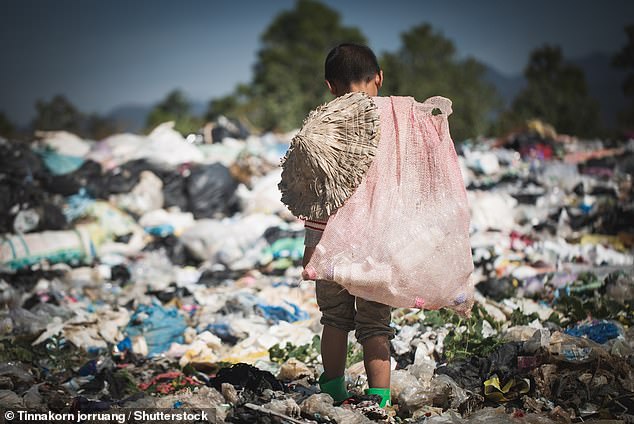Climate change could push humanity into a dystopian nightmare of fires, biblical–scale floods and food shortages.
But those lucky enough to survive the chaos could end up living amid a global economic meltdown.
Scientists at the University of Cambridge warn that global warming could make the average person 24 per cent poorer by 2100.
Life in Britain could resemble conditions in less developed countries, according to researchers – with higher unemployment, lower wages, closed businesses, and an even lower standard of living.
‘We have shown that climate change reduces income in all countries, hot and cold, rich and poor alike,’ say the University of Cambridge experts in a statement.
‘It will affect industries ranging from transport to manufacturing and retail, not only agriculture and other sectors commonly associated with nature.
Based on the findings, experts say humanity needs to stop burning fossil fuels now.
‘Urgent action is needed to address climate change and protect economies from further income losses.’

By 2100, today’s developed countries could be pushed further into an unprecedented type of poverty. Nearly a quarter of the global GDP per capita could be lost by 2100 due to global warming, scientists at the University of Cambridge report
Previous studies have shown that climate change results in more intense rainfall because warmer air can hold more moisture.
And because rainfall is increasing on average across the world, the chances of flooding are getting higher.
Rising sea levels and resulting flooding will lead to billions spent on repairing flood–damaged buildings and setting up flood defences.
What’s more, there will be costly disruptions to activities in sectors like tourism and agriculture that are based near the coast.
Human–caused global warming – which is largely due to burning fossil fuels such as coal for energy – will also see a reduction of arable land for crops as regions become drier.
All of this will affect ‘global GDP per capita’, the total economic output (gross domestic product) of all countries in the world divided by the world’s population.
It represents the average economic output per person on a global scale – and is a powerful indicator of individual economic well–being and prosperity.
For the study, the authors investigated the impact of continuous temperature increase from 2015–2100 on annual GDP per capita losses of 174 countries.

Already a familiar sight? Lower GDP could result in a near–future of higher unemployment, lower wages, closed businesses, and an even lower standard of living

Prior studies suggest climate change will cause food shortages, partly by reducing the productivity of crops

This chart plots scientists’ estimates of global income losses from rising temperatures by a given future year, typically 2100. A larger increase in global temperatures generally correlates with a larger proportion of GDP impacted
The list of countries included Australia, Bangladesh, Canada, China, France, Germany, India, Italy, Ireland, Japan, Mexico, the UK and the US.
The researchers used Shared Socioeconomic Pathways (SSPs) – modelling by the Intergovernmental Panel on Climate Change (IPCC) that shows different ways in which the world could change.
They compared future projections against two baselines – a scenario where temperature increases mimic the 1960–2014 trends, and a hypothetical scenario with ‘no further warming’.
The researchers found that if temperatures increase persistently by 0.04°C per year with minimal mitigation or adaptation, global GDP per capita will drop by 10–11 per cent by 2100.
But in the most extreme emissions scenario, the researchers project per capita income losses of 20–24 per cent compared to a ‘no further warming’ scenario.
The researchers also observed variation among countries, noting that hotter and low–income countries might face economic losses 30–60 per cent higher than the global average.
Examples include Afghanistan, Bangladesh and Burkina Faso in west Africa, commonly citied as the world’s hottest country.
The new study, published today in the journal PLOS Climate, emphasises the ‘importance of mitigating climate change’ and ‘implementing adaptation measures to minimize these negative effects.’

This chart shows global income losses from rising temperatures by 2100, based on climate scenarios of varying intensity. Failure to curb greenhouse gas emissions, mostly from burning fossil fuels, will result in greater GDP losses

Rising sea levels and resulting flooding will lead to billions spent on repairing flood–damaged buildings and setting up flood defences. Pictured, debris at the scene of a landslide in Huangmei county, Huanggang city, in China’s central Hubei province, July 2020
The authors stress the importance of abiding by the Paris Agreement, the international agreement to control and limit climate change.
Signed in 2015, the agreement famously aims to keep global temperature increases below 2.7°F (1.5°C) compared with pre–industrial levels.
Limiting the temperature increase to just 0.01°C per year would generate a global income gain of about 0.25 per cent compared to the scenario where temperature increases mimic the 1960–2014 trends.
According to the team, future studies should consider strategies for climate change adaptation and mitigation tailored specifically to certain countries.
But even with such initiatives in place, the long–term growth effects of climate change are ‘likely to persist’, especially in countries with hotter climates and lower incomes.
However, the team stress ‘no country is immune’ from the impact of climate change if greenhouse gas emissions are not curtailed.
‘Go back less than a decade and most economists would argue that climate change was something that only hotter, southern countries needed to worry about,’ the experts conclude.
‘We have challenged this assumption.’
This article was originally published by a www.dailymail.co.uk . Read the Original article here. .

